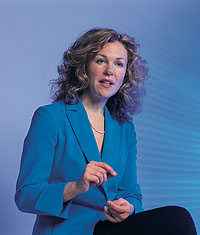

1. Stop network election projections until polls have closed nationwide.
"We in the West suffer from this every election, but this time, the whole nation suffered. The networks were calling Florida for Gore before some of the polls had closed in the panhandle part of the state. We all know how they had to retract that later, then they called the state for Bush and had to retract that too. After this last example, I think the networks are chastened by this.
"It can't be legislated. It's got to be a voluntary thing. They would have to volunteer not to call any state until after 11 p.m. Eastern time. And they would all have to agree to it."
2. Institute a uniform method of voting.
"Right now the poorer voting districts get the antiquated voting machines and the affluent districts get the good equipment. It's just wrong.
"I really get irritated by those who have complained about 'stupid voters who can't follow directions.' Listen, people are busy. At the time they are voting they are also trying to get to their jobs and take care of their families. In many places in Florida, there were huge lines and it overwhelmed poll workers. The voters did the best they could with a confusing ballot.
"We need a uniform method of voting. I'm not sure what type, although I sure would ban the butterfly ballot. Maybe fill in the circles like we have in Washington is the best way. I think a committee of election experts would have to decide."
3. Establish a uniform standard for determining voter intent.
"I'm not sure exactly what that standard would be. But now we have different states with different standards. A pregnant chad might be counted in Texas but not in Illinois. This solution would address some of the equal protection questions raised in the court cases. It would have to be uniform across the nation, which means each legislature would have to set the same standards."
4. Allow more time for election certification and the legal contest process.
"In the last election Al Gore basically ran out of time. There wasn't time to have a meaningful recount and then a meaningful contest to the results. Really, the presidential election doesn't have to be decided by Dec. 18. We could have the Electoral College meet in early January. Let's have the time periods be uniform and allow more time for each phase so that we can avoid the situation we just had in Florida."
5. Require automatic recusal for those officials who certify results.
"No matter what you think of (Florida Secretary of State) Katherine Harris, whoever does the election certification should be non-partisan for appearance's sake. Here we had the co-chair of the Bush campaign in Florida certifying the election of the person she campaigned for. It just looks unfair. We need to inject fairness into the system. Either there should be automatic recusal or the person certifying the election—usually the secretary of state—should be a non-partisan position."
What the future holds:
"It's hard to say. I think the networks are going to try to make amends; they will try to do better. But I don't think they will voluntarily hold off until it's 11 p.m. in New York. As for a uniform method of voting, I think there may be enough outrage that it will happen. Establishing a uniform standard for voter intent will be hard to do because each state has to pass it, and the same thing with allowing more time for certification and contest of elections. As for automatic recusal, it's easy, so why not do it?"
|
Lis Wiehl is an associate professor in the UW School of Law and director of its Trial Advocacy Program. A former federal prosecutor, her expertise is in ethics, evidence and criminal law. Wiehl was deputy chief counsel for the Democrats on the House Judiciary Committee during the impeachment hearings against President Bill Clinton. She does legal commentary for "All Things Considered" on National Public Radio and is a legal analyst for NBC. "I'm talking about an ideal world here. I'm not sure any of this could really happen," she says.